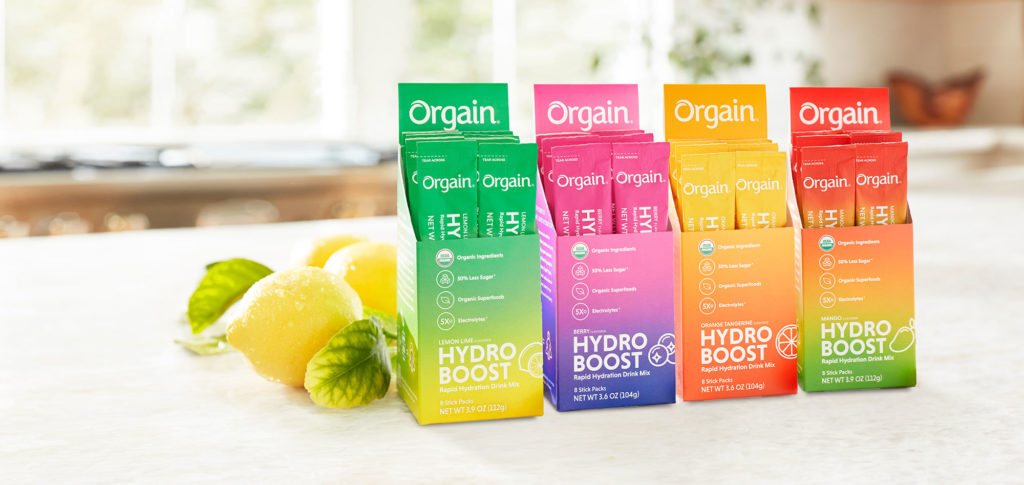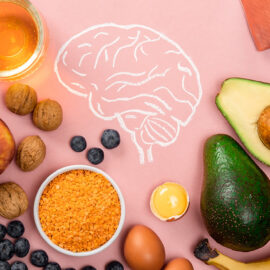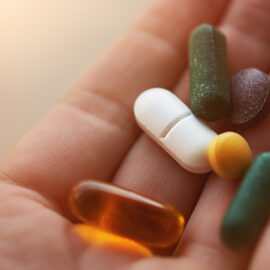Glowing skin is a beauty goal many people strive for, yet too few understand the important functions of skin and why skin integrity is important for both appearance and good overall health.1 Skin is the largest organ in the human body and one of its main functions is protection from external factors such as pathogens, temperature, irritants, allergens, and sunlight. Since skin changes such as rashes and breakdown (e.g., cuts, blisters, and scrapes) can be an early signal of health decline, healthcare professionals (HCPs) often include a skin examination as part of routine physical examinations for adults.2,3 While topical creams can provide support, proper nutrition is crucial for maintaining healthy, radiant skin from the inside out. This includes a healthful diet with adequate water and plenty of fruits, vegetables, protein, and essential fats.4
Skin Structure and Factors Contributing to Aging
Skin is composed of three basic layers:
- Epidermis – consists of several stratum layers and cells, including mostly keratinocytes, that perform many functions such as vitamin D formation, melanin production and antigen and sensory functions.
- Dermis – consists of the papillary layer, composed of loose connective tissue, and a reticular layer of deeper, dense connective tissue and bundles of collagen fibers. This layer includes sweat glands, muscles, hair and hair follicles, sensory neurons, and blood vessels.
- Hypodermis – the deepest layer of skin containing adipose lobules and some epidermal appendages of the hair follicles, sensory neurons, and blood vessels.1,5
A common cosmetic concern is premature skin aging.6 The anti-aging cosmetics market, including beauty and skin care products such as lotions, serums, and make-up, etc. is booming, and is expected to reach a whopping USD $62.26 billion by 2026.7 Normal aging of the skin causes degradation of collagen and elastic fibers in the dermis and thinning of the epidermis leading to changes including:
- The appearance of wrinkles and sagging.
- Longer healing time for cuts and bruises.
- Loss of fat, and skin appearing less plump and smooth.6,8
Skin ages due to several factors:
- Ultraviolet (UV) radiation contributes to skin inflammation, aging and cancer. UV can be divided into UV-A, B and C due to varying electrophysical properties. Managing exposure to UV is the most important modifiable risk factor for skin cancer.9
- Oxidative stress and inflammation play an important role in skin aging and damage. Reactive oxygen species (ROS), also known as free radicals, are damaging molecules that accumulate and react with other molecules in a cell.10 ROS causes oxidative stress, which can occur due to poor nutrition and UV exposure. Oxidative stress in epidermal cells eventually leads to cell inflammation and injury.1
- Chronic inflammation is common during the aging process, playing a role in skin aging and chronic disease processes such as type 2 diabetes and cardiovascular disease.11
- MicroRNAs, cellular RNA fragments, regulate the skin aging process, and chronic UV-B alters their expression in the skin.1
- Advanced glycation end products (AGEs) are the products of excess dietary sugar and UV exposure causing binding of sugar and protein which accumulates in skin. AGEs affect protein function in the dermis and promotion of skin aging which can result in tissue stiffening and reduced elasticity.11,12
Nutraceuticals for Skin Health
A well-balanced diet is critical for maintaining the health of skin. Vitamins, minerals, fatty acids, polyphenols and collagen peptides are just some of the nutraceuticals that are important for skin health, and here are just a few of the highlights of ways these nutrients support the skin and ways to get them.2 A diet rich in fruits and vegetables is strongly associated with good skin health and eating more produce is one way to support your skin.13 The National Institutes of Health Office of Dietary Supplements provides recommended amounts of vitamins and minerals based on gender and age. Consult a licensed nutrition professional regarding supplementation.
Vitamins
Vitamin A has an important effect on skin health. Vitamin A retinoids include retinol and retinyl esters. Preformed vitamin A is found in animal foods, and plants contain provitamin A carotenoids, such as plant pigments like beta-carotene, which are converted to vitamin A in the intestine. Vitamin A affects the thickness and color of skin, regulates the function of sebaceous glands, and influences the distribution of melanin in the skin.2,14
Sources: Sweet potatoes, spinach, carrots and fortified foods such as cheese and milk.14
Vitamin C is critical for skin health. Skin fibroblasts depend on vitamin C for synthesis of collagen, and skin keratinocytes can accumulate the vitamin, which can provide protection against UV radiation.13
Sources: Red peppers, kiwi, oranges and strawberries.15
Vitamin D can protect the skin by reducing DNA damage, inflammation and photocarcinogenesis caused by UV radiation.1
Sources: Fatty fish such as trout, salmon and mackerel and fish liver oils, fortified food products such as cereals and juice, and supplements.16
Minerals
Selenium helps scavenge free radicals in the body and protects the skin against oxidative stress from UV radiation.2
Sources: Brazil nuts, seafood, eggs, and whole wheat bread.17
Zinc is essential for cell division, maintains the health of skin and mucosal membranes, and is important for skin keratinocytes.2,18
Sources: Oysters, beef, baked beans and fortified cereals.18
Essential Fatty Acids
Dietary fat is closely linked to the fat composition of skin tissue, and inadequate intake of essential fats can lead to declines in skin function.1 Essential fatty acids such as linolenic acid (LA) improve skin hydration and help regenerate the epidermal lipid barrier.2 Omega-3 fatty acids, eicosapentaenoic acid (EPA), docosahexaenoic acid (DHA) and alpha-linolenic acid (ALA), play an important role in skin health.2,19 Promising evidence supports their anti-inflammatory effects on allergenic and inflammatory skin diseases such as psoriasis and atopic dermatitis.20 Despite fat being essential for skin health, human and animal models show that too much dietary fat, along with advancing age, can lead to inflammation and hinder the body’s ability to repair and heal wounded skin.21,22
Sources: LAs are found in nuts, seeds and oils and ALAs are found in flax seeds, chia seeds, walnuts, flaxseed oil, canola oil, etc. EPA and DHA are found in salmon, herring, trout, etc. In addition, a plant-based source of EPA and DHA can be found in algal oil supplements.19,23
Polyphenols
Polyphenols reduce oxidative damage and inflammation in the skin. They inhibit collagen degradation, increase collagen synthesis, and inhibit inflammation by regulating cytokine activity.1
Sources: Vegetables, fruits, tea, coffee, other plant-based foods and certain supplements.1
Collagen Peptides
Collagen peptides are found in food and supplements. A systematic review of 10 studies found that collagen peptide supplementation helped improve the appearance of aging skin.24 Although the process is not well defined, consuming collagen peptides might offer protection for aging skin in several ways:
- Participation with skin fibroblasts as a precursor for collagen synthesis.
- Removal of ROS from cells and protecting them from oxidative damage and inflammatory response.
- Promotion of collagen and hyaluronic acid synthesis.
- Inhibiting inflammation through regulation of cytokine activity.1,24
Sources: Beef, pork, chicken, turkey, and seafood.25
For quick and easy on-the-go sources of collagen, Orgain offers Orgain Grass Fed Pasture Raised Collagen Peptides and the new Orgain Collagen Creamer with Oatmilk, with each product providing 10 grams of grass-fed, pasture-raised collagen peptides.
Adequate Hydration Supports Skin Health
Water is the main component of cells and tissues, and it has a central role in maintaining cell homeostasis.26 Dehydration increases the risk of skin injury.3 Skin helps protect against excessive water loss, but consuming adequate liquids also helps to maintain skin health and appearance. Consuming at least 64 ounces of water per day is shown to promote skin hydration, especially for those who don’t consume enough water.2,26 For women, the recommendation is 9 cups per day and for men, it’s 13 cups per day. This includes water supplied by food, which comprises about 19% of total water intake, and other beverages. This amount is adequate for helping to maintain skin health. Exercisers require additional water based on the climate, exercise intensity and duration.26,27
Sun Protection from the Inside Out
UV radiation from sunlight can cause skin inflammation, wrinkles, dryness, age spots and skin cancer.8,20 Vitamins, omega-3 fatty acids and green tea catechins may provide protection against UV rays. Vitamin D3 and its active metabolites have anti-aging and photoprotective effects on skin by helping regulate proliferation of keratinocytes and build an epidermal barrier to maintain skin homeostasis. It also helps inhibit DNA damage and induce repair mechanisms to protect skin against aging and UV rays.28 Vitamin D3 and its metabolites mediate biological responses by binding to nuclear receptors, such as vitamin D receptors, aryl hydrocarbon receptors and liver x receptors, as well as nongenomic binding sites of vitamin D receptors in the skin. Promising evidence supports the benefit of an omega-3 fatty acid metabolite, specialized proresolving mediator maresin 1 (MaR1), to help mediate the damage of UV radiation. MaR1 is shown to suppress skin swelling and inhibit oxidative stress and production of inflammatory cytokines such as chemokine, ligand 4 and tumor necrosis factor.20
Green tea catechins from supplements or drinking tea can protect skin against UV radiation. A systematic review and meta-analysis of six randomized controlled trials found that catechin metabolites incorporate into skin, potentially offering long-term photoprotection of the entire body surface. Sunburn increases eicosanoid levels, such as nitric oxide (NO), in the skin, and green tea catechins help neutralize free radical production, reduce inflammation and protect against the negative effects of NO and other eicosanoids. Regular intake of a minimum of 540 mg of green tea catechins per day, through supplementation or by drinking about 5 cups of green tea, could offer this benefit.29
Healthcare Professionals Can Help
Nutrients can improve the appearance of skin, and it’s important to consider the role nutrients play to enhance skin health, prevent skin breakdown, improve the protective ability of skin to fight infections and prevent sun damage.2,20,29 Considering prevention is the most effective way to work against skin aging and support its overall health, healthcare professionals can play a key role in helping patients identify factors that impact skin health and provide guidance on the nutrients that could provide support from the inside out. When in doubt regarding any skin concerns, patients should be referred to a credentialed dermatologist.
In providing recommendations to your patients or clients of foods that support skin health, Orgain provides a wide array of options including Orgain Grass Fed Pasture Raised Collagen Peptides and the new Orgain Collagen Creamer with Oatmilk. Since hydration is also essential, Orgain’s latest product, Hydro Boost Rapid Hydration Drink Mix, is a great option to help increase fluid intake while providing vitamin C – a vital nutrient for skin.
Listen to new episodes of The Good Clean Nutrition Podcast, now available on the Orgain Healthcare app, and be sure to subscribe now on Apple Podcasts, Spotify or anywhere you listen to podcasts so you never miss a new episode!
Episode 14: Exploring the Benefits of Dietary Collagen for Skin, Joints & Overall Health with Molly Kimball, RD, CSSD

Molly Kimball, RD, CSSD is a Registered Dietitian, Board Certified Specialist in Sports Dietetics, and works as a nutrition journalist and practitioner. Molly has been the go-to nutrition expert for New Orleans’ ABC affiliate WGNO since 2009, with weekly TV segments on WGNO’s Good Morning New Orleans, Get Fueled with Molly, and is regularly featured as a nutritional expert for national news stories including outlets such as Vogue, The New York Times, Newsweek, Shape, Health, Fitness, Runner’s World, Wine Enthusiast, Cosmopolitan, WebMD, and CNN.com. She is the author of the Eat Fit Cookbook, a collection of chef-inspired recipes for the home and host of the podcast FUELED wellness + nutrition with Molly Kimball.
Dietitian Connection is a global community of more than 42,000 members and a hub of free continuing education and resources. We are committed to raising the voice of dietitians and creating more impact as a profession, and we want you to join the movement!
Catch up on our recent webinar about the pros and cons of intermittent fasting, hosted by Joy Bauer. What does the science say? Is it an effective weight management tool? Does it have applications in other health conditions? And how does it impact those who suffer from disordered eating? Tune in here for the latest insights and earn 1.0 CEU from CDR.

Created based on guidelines set forth by the World Health Organization for Oral Rehydration Solutions, Hydro Boost is enhanced with superfoods and delivers 5x the amount of electrolytes with 50% less sugar when compared to traditional sports drinks. The Hydro Boost formula utilizes the right balance of key electrolytes and ingredients including pink Himalayan sea salt and 9 grams of organic cane sugar per serving to replenish fluids and restore hydration. This combination of sodium, glucose and citrate boosts the delivery of electrolytes and fluids into cells faster than water alone to provide everyday wellness hydration. As with all Orgain’s products, it contains no artificial sweeteners, colors, or flavors.
Learn more about Hydro Boost on orgain.com or contact us at [email protected] with any questions and an Orgain Healthcare team member will respond.
Plant-based diets are a hot topic in renal nutrition. Register for this educational webinar to learn more about the research behind the use of plant-based diets for patients with CKD and how they can improve acidosis, blood sugar, hypertension and even manage potassium and phosphorus levels. This session will cover how plant-based diets can be helpful for patients in all stages of kidney disease – from newly diagnosed to dialysis.
Whether on-demand or live, all the webinars in Orgain’s Professional Education Webinar Series are available for 1.0 CPEU for RDNs and NDTRs. Register Here
Have you downloaded the Orgain Healthcare App yet? Available in the App Store and Google Play, our app provides easy access to Orgain Healthcare’s library of on-demand webinars – each offering one continuing education credit for RDNs and NDTRs.
If you plan to attend one of the following events, we hope to see you at Orgain’s booth!
- Food & Nutrition Conference & Expo (FNCE)
- October 8-11, Orlando, Florida



